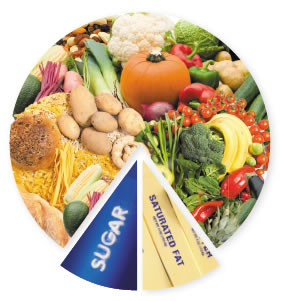
5 timeless habits for better health

What are the symptoms of prostate cancer?

Is your breakfast cereal healthy?

When pain signals an emergency: Symptoms you should never ignore

Does exercise give you energy?

Acupuncture for pain relief: How it works and what to expect

How to avoid jet lag: Tips for staying alert when you travel

Biofeedback therapy: How it works and how it can help relieve pain

Best vitamins and minerals for energy

Should you take probiotics with antibiotics?
Nutrition Archive
Articles
Considering a vegetarian diet: Is meat-free really better?
Eating a vegetarian diet changes mealtime focus from one hunk of protein to a mix of proteins and fats. Get creative, and have fun with your menu. Images: Thinkstock |
More evidence that plant-based diets can help you stay healthy.
Eat a handful of nuts, get a bucketful of benefits
In particular, nuts and peanuts are getting attention for their heart benefits. A study published in JAMA Internal Medicine on March 2, 2015, found that among 72,000 Americans in the southern United States and 135,000 people in China, eating peanuts (a legume) and nuts (such as almonds and walnuts) was associated with a reduction of 17% to 21% in the risk of dying from any cause, especially heart disease. This study was not a randomized trial, and therefore it cannot prove that a regular diet of nuts has such positive health effects. However, two previous randomized trials did find that such a diet was heart-healthy. "Nuts and peanuts are rich in unsaturated fatty acids, known for reducing inflammation, improving blood vessel function, and lowering LDL cholesterol," says Debbie Krivitsky, director of clinical nutrition at the Cardiovascular Disease Prevention Center at Harvard-affiliated Massachusetts General Hospital. The American Heart Association recommends eating four servings of unsalted, unoiled nuts per week. A serving size is a small handful (1.5 ounces) of whole nuts or 2 tablespoons of nut butter.
Image: Thinkstock
Not all processed foods are unhealthy
Don't be misled by well-intentioned advice. Some processed foods offer nutritional value and convenience.
Nutrition gurus often urge us to spurn processed foods in favor of whole ones. But not all processed foods are necessarily bad. "Most food needs to go through some sort of processing for it to even be edible and digestible," says Stacey Nelson, a registered dietitian and manager of clinical nutrition at Harvard-affiliated Massachusetts General Hospital. "The minute you cook something, you are processing it."
Scientifically proven diets that work
Heart-healthy diets emphasize fruits and vege-tables as a major source of daily calories. Images: Thinkstock |
Substantial research proves the Mediterranean and DASH eating plans offer important health benefits for men.
Iron and your health
If you feel run-down, lack of iron is probably not the cause. You can easily get enough of this key mineral in your diet.
Decades ago, advertising for the liquid vitamin and mineral supplement Geritol warned against "iron-poor, tired blood." It's a reference to the fact that red blood cells need iron to make hemoglobin, the molecule that grabs oxygen and transports it around the body.
Gain more weight, get more GERD
Maintaining a healthy weight is the best way to rein in gastroesophageal reflux disease (GERD), or chronic heartburn, according to a study in The American Journal of Gastroenterology. Researchers found that GERD symptoms increased for every incremental rise in body mass index (BMI), which measures the ratio of weight to height.
In GERD, the acidic contents of the stomach back up into the lower esophagus, causing burning pain. The most effective treatment for GERD is taking an acid-reducing proton-pump inhibitor medication, such as omeprazole (Prilosec). People who are overweight are much more likely to develop GERD.
7 good suggestions from the proposed dietary guidelines
The plant-based diet caps sugar and saturated fats at 10% of calories each. |
The new recommendations for healthy eating emphasize diet over individual nutrients and overturn some long-held beliefs.
Add strength training to your fitness plan
Muscles at workDynamic resistance occurs when muscles and joints move, such as when you raise and lower a hand weight. Image: Thinkstock |
Boosting your muscle mass may trigger changes that enhance heart health.
Get cracking: Why you should eat more nuts
Nuts are rich in unsaturated fats, fiber, and other nutrients with possible cardiovascular benefits. Images: Thinkstock |
Munching a small handful every day may protect your heart.
To lower stroke risk, be sure to get this B vitamin
Green vegetables and citrus fruits are good natural sources of folate.
If you're among the one in three American adults with high blood pressure, be sure you're getting enough of the B vitamin known as folate. Doing so may lower your odds of having a stroke, a new study suggests.

5 timeless habits for better health

What are the symptoms of prostate cancer?

Is your breakfast cereal healthy?

When pain signals an emergency: Symptoms you should never ignore

Does exercise give you energy?

Acupuncture for pain relief: How it works and what to expect

How to avoid jet lag: Tips for staying alert when you travel

Biofeedback therapy: How it works and how it can help relieve pain

Best vitamins and minerals for energy

Should you take probiotics with antibiotics?
Free Healthbeat Signup
Get the latest in health news delivered to your inbox!
Sign Up











